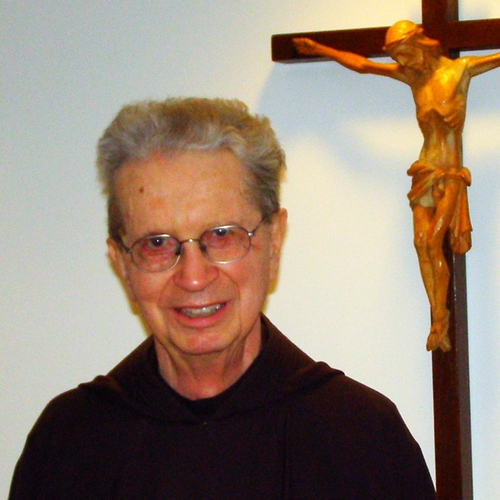
Date of birth: August 1, 1929
Place of Birth: Pittsburgh, PA
Investiture: July 13, 1949
Temporary Profession: July 14, 1950
Perpetual Profession: July 14, 1953
Date of death: September 8, 2013
Burial: St. Augustine Cemetery,
Millvale, PA
"All this leads to two questions:
 what am I to do
and where am I to do it?" (May 22, 1975)
It's a story that winds its way around the world. If Francis wanted his brothers to become 'itinerants,' pilgrims and strangers on a journey in this world, he had a real brother in Maurice Sheehan.
Pittsburgh was always his hub because it was the 'home' of the brotherhood, but the spokes emanated to Herman, PA; Olean, NY; Oxford, England; Lusaka, Zambia; and Wheeling, WV. Fr. Maurice loved History, and his passion for it would take him to places where he could share it. He wanted to be a teacher and researcher and, all along, to do it as a brother. Finding a place to settle for long didn't happen. Times would change, as would the institutions he served, and as the years passed, our brother Maurice would find options closing behind him as he forged forward to continue the path he knew best and loved best "“ all the while living the Franciscan story he would famously recount.
The road began, of course, in Pittsburgh, PA. From the time he was born in the Knoxville section of the city on August 1, 1929, until the day he died in the Stanton Heights neighborhood of Pittsburgh's East End on September 8, 2013, all roads led back to the city of the Pirates, the Steelers and Heinz Ketchup. He was proud to be a Pittsburgher, and his accent would betray him whether words were attempted in French, Italian, Latin or English. He wasn't "provincial" in a narrow sense. He was known throughout Capuchin Provinces, Franciscan Orders and even Universities. Yet, his conversations (while he was "˜away,' in any case) somehow wound their way back to "the "˜burgh."
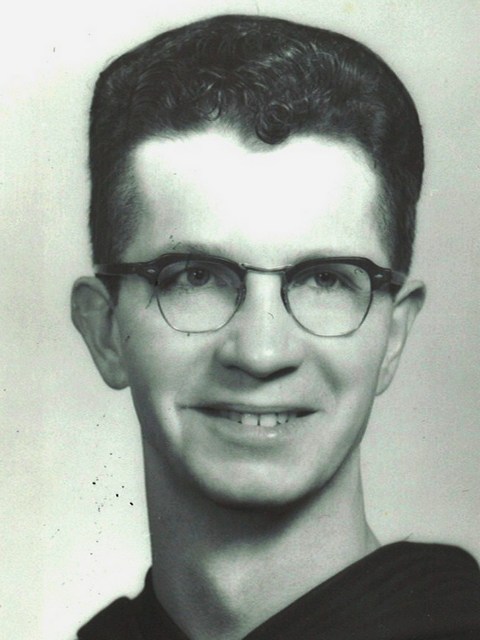 Born to William and Elizabeth (McGough) Sheehan on August 1, 1929, he was given his father's name at baptism in their home parish of St. Canice Church. In 1943, Young William entered St. Fidelis High School Seminary in Herman, PA, with the Capuchin friars during the Second World War. He was always recognized as having a keen intellect, and his studies in History were sparked by an avid fascination with France and the age of Napoleon. His eventual students would joke that his habit of putting his hand within the fold of his habit was a Napoleonic tribute while the continual "˜flick' of his hand would mark his discourse as a benevolent tyrant making an irrefutable point.
Born to William and Elizabeth (McGough) Sheehan on August 1, 1929, he was given his father's name at baptism in their home parish of St. Canice Church. In 1943, Young William entered St. Fidelis High School Seminary in Herman, PA, with the Capuchin friars during the Second World War. He was always recognized as having a keen intellect, and his studies in History were sparked by an avid fascination with France and the age of Napoleon. His eventual students would joke that his habit of putting his hand within the fold of his habit was a Napoleonic tribute while the continual "˜flick' of his hand would mark his discourse as a benevolent tyrant making an irrefutable point.
As he began his novitiate as a Capuchin in July, 1949, he was given the name "Maurice" after the death of our confrere Maurice Ackerman that April in Kansas. He professed his first vows as a Capuchin Franciscan friar on July 14, 1950, and after completing college at St. Fidelis in 1952, he made perpetual profession in 1953. Maurice was ordained to the priesthood on June 4, 1955, and upon finishing his theological studies a year later, was assigned to Herman with a dual job: as Assistant Pastor to St. Mary Parish and as Teacher at St. Fidelis Seminary. He rose quickly to leadership, leaving behind his one-year parochial work, and accepting the position first as Prefect of Studies and, then, as Prefect of Discipline (1957-1964). All the while, he taught History. During the summer hiatuses from the seminary, he worked toward his Master of Arts in the field at Catholic University in Washington, DC, (1957-1964). He was the seminary's Principal from 1964-1970.
Fr. Maurice was no push-over. Students could sense his compassion when Maurice thought it necessary to reveal, but for young men called to his office or corrected in the dining hall, he was a force to be reckoned with. There was a reason he didn't have a chair opposite his desk in the office: when a student reported to him, comfort was not an option.
Despite the strong hand he showed to students, he enjoyed laughs and good conversations with the friars. He lamented later in his life that:
I had great difficulty talking to the clerics [student friars of college age], due to some extent to differences in age, outlook, etc, but most of all because, as the faculty agreed in its evaluation, few of them know how to talk to adults. I have had few real colloquies since Christmas and most of them occurred when we had visitors. TV becomes the crutch; but worse than that, I find myself becoming negative, sour, and close-mouthed, having to hunt for humor in things. That I do not like, nor do I see finding satisfaction away from the community as a solution. (5/22/75)
He actually enjoyed and looked forward to being with the brothers, and he was not above playing tricks or laughing about being tricked by them. Br. Sigmund Dengg, OFM Cap. (+1996) was no match for Maurice's intellectual prowess. Raised as an orphan at our Toner Institure in Pittsburgh, Sigmund remained illiterate throughout his life. Sigmund answered a phone message for Maurice but could not write the message; he called Maurice's office and bedroom to no avail. Sigmund trudged to the High School in frustration. "Didn't you hear the phone ringing?" he chided. Maurice answered tersely, "I'm not a slave to a phone." 'Sig' was not the type to walk away from a chance for revenge.
Maurice was in Butler one day and locked himself out of his car. Unfortunately, Br. Sigmund was in charge of those cars. Maurice phoned to ask for an extra key, but he added to the secretary in Herman, "Don't send Br. Sigmund." Sigmund was in the office and couldn't pass up the opportunity. Arriving in Butler, he found the car, but not Maurice. He covertly unlocked the back car door and waited.
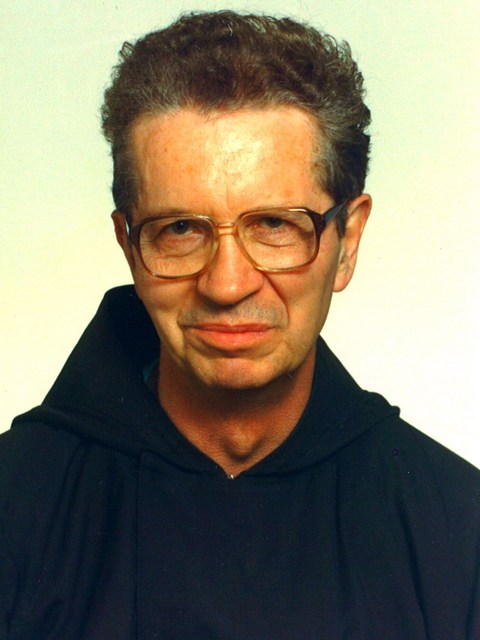 When Maurice returned to the car, Sigmund razzed him about locking his keys in the car, implying that Maurice's stupidity was beyond this simple lay friar's comprehension. "Did you check the other doors?" yelled Sigmund. Maurice insisted he had, while Sigmund made a drama of trying each door before successfully opening the one he had unlocked. Maurice was embarrassed and humiliated. Sigmund let him stay that way before each had a hearty laugh.
When Maurice returned to the car, Sigmund razzed him about locking his keys in the car, implying that Maurice's stupidity was beyond this simple lay friar's comprehension. "Did you check the other doors?" yelled Sigmund. Maurice insisted he had, while Sigmund made a drama of trying each door before successfully opening the one he had unlocked. Maurice was embarrassed and humiliated. Sigmund let him stay that way before each had a hearty laugh.
Being a leader in a Seminary High School in the 1960s was not all laughs. We can too easily forget the social and institutional changes taking place in that world. Being a leader would mean trying to straddle the traditional forms of education while incorporating new insights to address a changing generation with a divergent horizon of thought.
Maurice resorted to history for his wisdom, and published two articles during this period: "New England Private Schools, a Survey of their Latin and English Curricula" (1962) and "Should the Office of Guidance Counselor be Separate from that of the Spiritual Director?" (1968). The times they were a-changing. The historian in him would often resort to a firm belief that "˜what goes around, comes around,' and he could always cite some historical event which was 'just like' what was happening around him. History gave him the consolation that others before him had undergone their own brand of turmoil and adaptation. At the same time, it gave him the confidence to face change as an inevitable historical cycle.
In 1970, a popular young friar-priest was appointed as the new Principal to St. Fidelis High School, and Maurice headed to Oxford University in England to pursue research in Franciscan History. His doctoral thesis, "The Religious Orders at Oxford, 1221-1370" allowed him to view more intently another era when change and adaptation were essential to the growth and diffusion of the Franciscans. He received his "D.Phil.Oxon" (his Oxford doctorate) with the publication of his thesis in 1974. His knowledge and research would make him an indispensable resource for the historical development of the Franciscan charism.
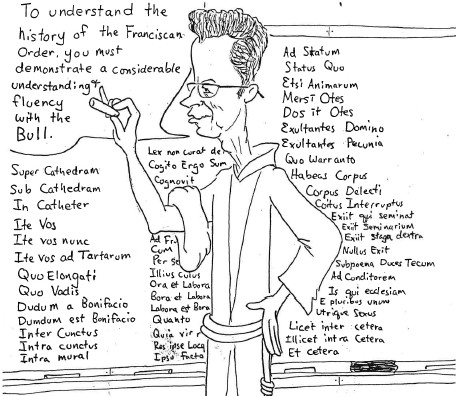 From 1973-1978, he returned to St. Fidelis; the Provincial Council had thought that being a College faculty member would allow him the time for continued research, but they added the role of Treasurer in 1974 which would dishearten the scholar in a letter of May 1975:
From 1973-1978, he returned to St. Fidelis; the Provincial Council had thought that being a College faculty member would allow him the time for continued research, but they added the role of Treasurer in 1974 which would dishearten the scholar in a letter of May 1975:
I have taught six courses in the last two years. Four of them were taught last year (only one in history, three in languages) and all were courses I had never taught before. Two were taught this year; the one in the first semester was an old course; the one in the second semester was a new one: Franciscan History and Spirituality. The Franciscan course was to be elective but since no cleric 'elected' it, and I saw myself as having no choice but to resign as treasurer because I would not be teaching the second Semester; [the College President] went to work and 'induced' seven clerics to take it for credit and four to audit it. They resented this and the resentment never disappeared; it was forced feeding all the way. By January I was asking myself: what does the future hold for me at Herman?
His expertise in Franciscan research was under-utilized. 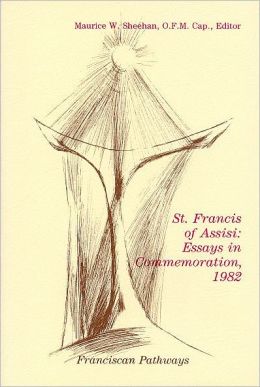
One suspects that Maurice found his greatest happiness in the 11 years that followed. He accepted the position as Assistant Director to the Franciscan Institute of St. Bonaventure University in Olean, NY. Finally, he was among scholars while teaching subjects which would focus him in the Franciscan field and deepening his research skills. Except for a sabbatical year from 1986-1987 back at Oxford and in Germany, his time as Professor and Assistant Director allowed him a community of brothers dedicated to education and intensely interested to debate all issues religious, historical or political. He found life-long friends from all branches of the Franciscan family there, and students found a man who inspired them with the breath of his knowledge and the depth of his humility and humanity "“ no pretensions for this Pittsburgher.
As a credit to his respected status in the Province, he was elected a Definitor of the Province by the friars to two consecutive terms (1980-1986) during the provincialate of Fr. Bob McCreary, OFM Cap.
Maurice was an active member of the Medieval Academy of America and the Catholic Historical Association, but his final three years at "Bona's" (1987-1990) became more difficult as after returning from a sabbatical to undertake the role of the Institute's Acting Director. The OFM community of the Holy Name Province was attempting to redefine the scope and purpose of the Institute and had asked Maurice to fill the vacancy left by his predecessor, Fr. Conrad Harkins, OFM. A different leadership, less dedicated to research and more focused on formation and the practical application of the Franciscan charism, was being sought. Maurice was sure the change would destroy the academic integrity of the Institute.
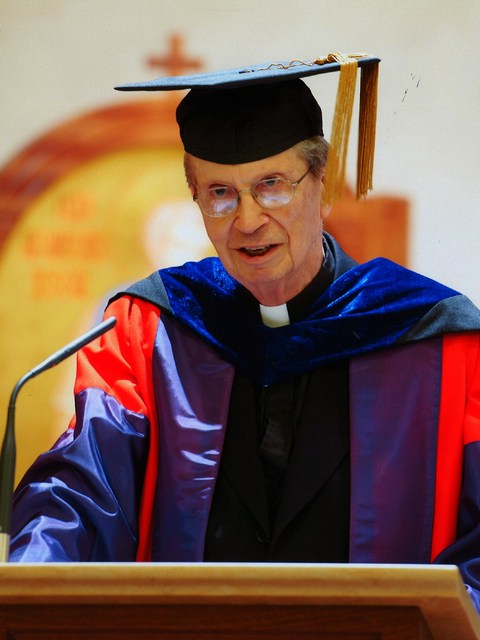 Oxford called again. The position of Warden (rector) at Greyfriars Hall of Oxford University was open, and the Capuchin Province of England sought out Maurice to accept the position. Though tenured at St. Bonaventure's in 1984, Fr. Maurice accepted the lead role where he had matriculated for his admission to Oxford earlier. In the fall of 1990, he joined a long line of friars in coordinating the Hall's life and work. The original Greyfriars church and friary was founded by the first Franciscan brothers in 1224, during the life of St. Francis. Though suppressed during the 16th century Reformation, the Order had a long and esteemed history in Oxford, listing many famous alumni, including Robert Grosseteste. The Capuchins established a residence there and were recognized by the University as a House of Studies in 1910.
Oxford called again. The position of Warden (rector) at Greyfriars Hall of Oxford University was open, and the Capuchin Province of England sought out Maurice to accept the position. Though tenured at St. Bonaventure's in 1984, Fr. Maurice accepted the lead role where he had matriculated for his admission to Oxford earlier. In the fall of 1990, he joined a long line of friars in coordinating the Hall's life and work. The original Greyfriars church and friary was founded by the first Franciscan brothers in 1224, during the life of St. Francis. Though suppressed during the 16th century Reformation, the Order had a long and esteemed history in Oxford, listing many famous alumni, including Robert Grosseteste. The Capuchins established a residence there and were recognized by the University as a House of Studies in 1910.
But Fr. Maurice found himself anew in a less-than-ideal academic climate. The majority of the Hall's residents were undergraduates and, matriculating at the University under the auspices of Greyfriars, the students were not concentrating in the Franciscan field. His brief three year tenure bespeaks his discontent. Yet, friars who did come to Oxford for a period of study testify to his ever-present hospitality and fraternal care:
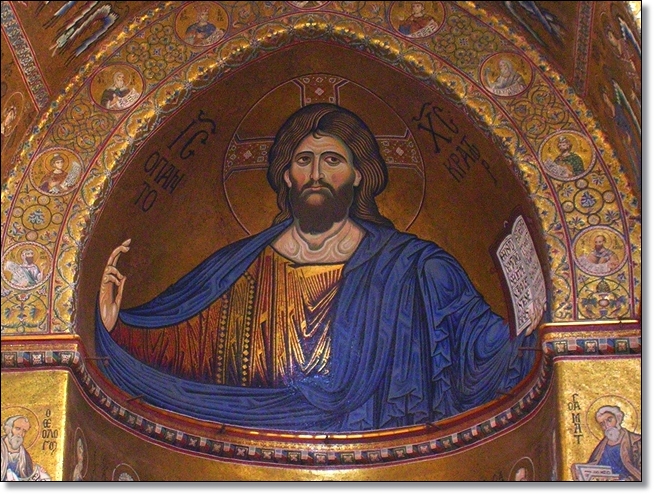 The first time I met him at Greyfriars in summer, 1991 [to learn English], I knew that he loved the image of Christ in Monreale (Sicily). In September of that year, I mailed a postcard from Monreale to Oxford with that face of Christ the Pantocrator (Almighty). As soon as I returned to Oxford a year later, Maurice . . . ran to meet me at the porter's office - first, to greet me, and secondly to thank me for the card. No other friar at Oxford had ever done the same or been so kind. Even now I wonder how Maurice had learned that I was arriving at Oxford that day and hour and how he kept the remembrance of that card in his mind for a whole year! Such wonderful brothers like Maurice testify to the great and true tradition of the Capuchin Reform. (Gianluigi Pasquale, OFM Cap., Province of Venice, Italy)
The first time I met him at Greyfriars in summer, 1991 [to learn English], I knew that he loved the image of Christ in Monreale (Sicily). In September of that year, I mailed a postcard from Monreale to Oxford with that face of Christ the Pantocrator (Almighty). As soon as I returned to Oxford a year later, Maurice . . . ran to meet me at the porter's office - first, to greet me, and secondly to thank me for the card. No other friar at Oxford had ever done the same or been so kind. Even now I wonder how Maurice had learned that I was arriving at Oxford that day and hour and how he kept the remembrance of that card in his mind for a whole year! Such wonderful brothers like Maurice testify to the great and true tradition of the Capuchin Reform. (Gianluigi Pasquale, OFM Cap., Province of Venice, Italy)
Our brother Gianluigi also spoke of having learned much about Pittsburgh, PA, in late evening conversations with the Warden. Friars from our own Province would not be puzzled by this Italian brother's recollection; the irony would be that while visiting in Pittsburgh during those years of his British residence, Maurice hardly uttered a sentence without the words "in England," the "Queen" or "Diana" appearing (with a wink and a smirk, of course).
Maurice returned to Pittsburgh. He was Visiting Professor for a semester at the Franciscan School of Theology in Berkeley in 1993 (whose student body would differ little from its east-coast counterpart, the Washington Theological Union), and he served in help-out ministry in this unwelcome interim, particularly as a confessor at downtown Pittsburgh's St. Mary Parish. Were his years of teaching over at the age of 64? Had he become 'redundant' (as the British say)? He would be in this 'limbo' for the next three years, serving as temporary administrator to St. Alphonsus Parish in Wheeling, WV, in 1994 and Chaplain to the Franciscan Sisters of Millvale in the summer of 1995.
That Spring, Fr. Maurice was able to stretch his teacher wings at the invitation of the Capuchin friars of Zambia. There, from January to July, he was a visiting professor at St. Bonaventure College (Franciscan Formation Centre) near Lusaka. In January, 1995, he wrote:
I started teaching on the 19th and have four courses: three in Franciscanism and one in medieval Church History, not less than 21 in class nor more than 33. The African students are rather passive in class, self-conscious I think, but I am hoping they will open up. The library is surprisingly good, very good in Franciscanism. The drawback is that there are no other good libraries to draw on, so if we don't have it, there's little chance of getting it.
In 1996, an offer was accepted from Holy Apostle College and Seminary in Cromwell, CT, to serve as Academic Dean. At the age of 67, Fr. Maurice once again left Pittsburgh to live among brothers of another region, this time in New England. A Capuchin friary in Middletown, CT, served as his fraternity while he lived among the Missionaries of the Holy Apostles. The work as Dean allowed him a respected position, and his kindness was especially appreciated by the students who needed his advice and approval for course work. He would never return to focus in his chosen field of Franciscan history, but his 'retirement years' did allow the opportunity for great conversations, for general Church history courses, for occasional winter visits in a southern climate (more agreeable to his increasing arthritis discomfort) and for visits back to Pittsburgh and the motherhouse (St. Augustine Friary) to keep in touch. He served as Academic Dean until his final move home to Pittsburgh at 82 in 2011.
Maurice's health was rarely perfect, but he never complained or wallowed in self-pity. There was no doubt that he was concerned. A chronic back problem forced him to find the most comfortable way to sit in a car or a living room; a case of gout plagued him in Zambia; in the nineties, he was alerted to an abdominal aortic aneurysm whose detection allowed him to be among us for another decade and more.
It was ultimately a continued weakening of his physical health which led to his move to Villa De Marillac Nursing Home in Pittsburgh's east end, not far from St. Augustine Friary, in July 2013. There was hope that a physical rehabilitation regimen would offer some comfort and strength. It wasn't to be. After a series of medical complications, Fr. Maurice Sheehan died on Sunday, September 8, 2013 (the feast of the Birth of Mary) at the age of 84.
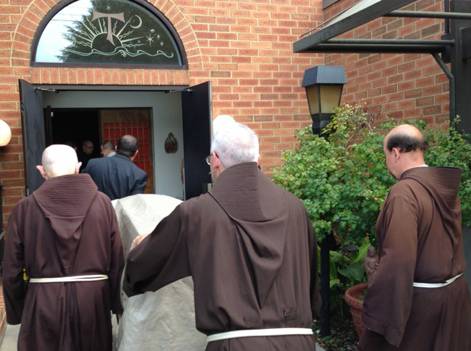 Maurice Sheehan's body was prepared for its final journey to St. Augustine Friary on Wednesday, September 11. Most of the resident friars, the hermitage friars and others were on hand for the reception. The casket was placed in the chapel, and Provincial David Nestler, OFM Cap., led the assembled friars in prayer. Guardian Phil Fink, OFM Cap., led about forty friends and friars in the Wake Service. Gervase Degenhardt, OFM Cap., spoke eloquently and touchingly about his frequent companion at St. Fidelis. He was followed by Maurice's dear student, long-time friend and then colleague, Sr. Margaret Carney, OSF (President of St. Bonaventure University), and Fr. Douglas Mosey, MHA (Rector of Holy Apostles Seminary, Cromwell, CT), Maurice's "office neighbor" for 15 years.
Maurice Sheehan's body was prepared for its final journey to St. Augustine Friary on Wednesday, September 11. Most of the resident friars, the hermitage friars and others were on hand for the reception. The casket was placed in the chapel, and Provincial David Nestler, OFM Cap., led the assembled friars in prayer. Guardian Phil Fink, OFM Cap., led about forty friends and friars in the Wake Service. Gervase Degenhardt, OFM Cap., spoke eloquently and touchingly about his frequent companion at St. Fidelis. He was followed by Maurice's dear student, long-time friend and then colleague, Sr. Margaret Carney, OSF (President of St. Bonaventure University), and Fr. Douglas Mosey, MHA (Rector of Holy Apostles Seminary, Cromwell, CT), Maurice's "office neighbor" for 15 years.
Nearly fifty friars and postulants attended the 10:00am funeral Mass on Thursday, September 12, along with family and friends, including a good showing of our Franciscan Sisters from Millvale. The Provincial Minister served as celebrant while Maurice's homilist, former student and friend, Tom Betz, OFM Cap., preached a rousing homily. He pointed to Maurice's love of Church history not simply as a recitation of events and dates, nor a litany of human foibles. Maurice taught and spoke of history knowing that the providence of our loving God has been, is and always will be history's decisive event.
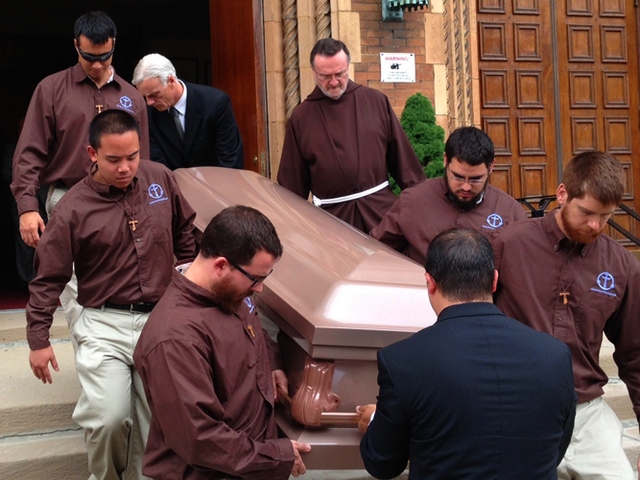 Moments after the casket containing Maurice's remains arrived at its final resting place, the skies opened, and rain poured sending the faithful scurrying for cover. The Provincial, the intrepid pall bearers and several other friars with the Funeral Director did not flee for shelter and remained pummeled by the torrent as they prayed near the grave. Richard Zelik, OFM Cap., safe in the shelter of the cemetery chapel, joked, "Maurice has the last laugh!" Maybe it was because Maurice had the advantage of not getting wet.
Moments after the casket containing Maurice's remains arrived at its final resting place, the skies opened, and rain poured sending the faithful scurrying for cover. The Provincial, the intrepid pall bearers and several other friars with the Funeral Director did not flee for shelter and remained pummeled by the torrent as they prayed near the grave. Richard Zelik, OFM Cap., safe in the shelter of the cemetery chapel, joked, "Maurice has the last laugh!" Maybe it was because Maurice had the advantage of not getting wet.
St. Francis of Assisi once admonished the friars as they gained popularity through telling stories of the saints. "It is a great shame for us," he said, "that the saints have actually accomplished great things, and we want only to receive glory and honor by recounting them (Adm VI)." Maurice didn't just teach history, he lived it and sometimes he even made it as the first American warden at Greyfriars Hall at Oxford and the first Capuchin director of the Franciscan Institute. He never applauded his own efforts or talents, and he became a kind of hero to numerous Franciscan men and women worldwide who didn't just learn about Francis of Assisi. Through Maurice, they came to appreciate where a life of his unique brand of humility, itinerancy and minority leads, and this time, it's not in Pittsburgh.
